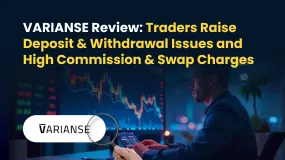简体中文
繁體中文
English
Pусский
日本語
ภาษาไทย
Tiếng Việt
Bahasa Indonesia
Español
हिन्दी
Filippiiniläinen
Français
Deutsch
Português
Türkçe
한국어
العربية
CySEC Comes Up with New Warning List
Abstract:CySEC intensifies actions against unauthorized brokers, blacklisting multiple providers for offering FX and cryptocurrency services without proper authorization. Stricter regulations and penalties are emphasized, urging compliance.

The Cyprus Securities and Exchange Commission (CySEC) has escalated its efforts in the fight against unauthorized brokers by issuing a new warning directed at multiple unlicensed providers. These entities have found themselves on a blacklist due to their offering of trading services in foreign exchange (FX) and cryptocurrencies without the requisite authorization from CySEC.
It's noteworthy that some of these unlicensed entities are falsely asserting affiliations with regulated brokers in Cyprus holding the Cyprus Investment Firm (CIF) License. In response, CySEC has disclosed a list of blacklisted domains associated with these unauthorized providers, which includes apexfinancialtrading.com, bullmarketsllc.com, tcmglobals.com & portal.tcmglobals.com/signup, opticaltradings.com, arkiseguro.com, front-service24.site, miningcity.com & nemtlex.online, evalonassets.com, expertminingcryptocurrency.com, and equityassetholdings.com.

As CySEC continues to reinforce its commitment to more stringent licensing guidelines and operating regulations, certain aspects of the rules and operations are becoming clearer. One prominent change is the obligation for all service providers dealing with crypto assets to register with CySEC. Failure to comply with this stipulation will result in severe consequences, ranging from substantial fines, potentially up to €350,000 ($370,000), to custodial sentences lasting up to five years. Violators may, in some instances, face a combination of both penalties.
In its efforts to address the rise in unregulated and volatile investment products, CySEC has recently released research on retail investment behaviour. The findings revealed a concerning lack of diligence among investors, with a quarter spending only 6-7 days researching a specific product. Additionally, 7% admitted to doing less than 30 minutes of due diligence or none at all before investing. Only 30% of respondents checked their broker's licensing on the country's regulator's website, while 51% relied on company reviews or the firm's own website.
Highlighting the risks associated with online trading, Cypriot regulators launched an educational campaign to inform citizens about potential hazards. The country's financial regulatory body spearheaded the initiative, cautioning against the use of colorful apps that portray trading as empowering rather than intimidating. This campaign aims to address the fear of missing out on easy money and promote a more informed approach to online trading.

Disclaimer:
The views in this article only represent the author's personal views, and do not constitute investment advice on this platform. This platform does not guarantee the accuracy, completeness and timeliness of the information in the article, and will not be liable for any loss caused by the use of or reliance on the information in the article.
Read more

Forex Expert Recruitment Event – Sharing Insights, Building Rewards
WikiFX Community launches the "Forex Expert Recruitment" event – cash in on your knowledge and turn it into your “Gold Mine”!

Admirals Cancels UAE License as Part of Global Restructuring
Admirals cancels UAE FSRA license and sells Australian subsidiary in 2025 restructuring.

WikiEXPO Dubai “Welcome Party” Concludes Successfully, Setting the Stage for the Main Event!
On the evening of November 10, 2025, the highly anticipated WikiEXPO Dubai “Welcome Party” was successfully held at the 6th Floor, Conrad Dubai, UAE. Serving as a “prelude” to the official opening of the expo, this event provided a high-end yet relaxed communication platform for representatives of global regulatory bodies, leaders of Fintech companies, renowned brokers, and senior executives of investment institutions.

VARIANSE Review: Traders Raise Deposit & Withdrawal Issues and High Commission & Swap Charges
Are you losing both while depositing and withdrawing your capital at VARIANSE? Does the broker give the currency conversion rate excuse for this? Have you been trapped with spreads charged higher than promised? Do you bear steep commission and swap charges at this broker? Traders frequently report these trading issues online. In today’s VARIANSE broker review, we have shared some trading complaints that have grabbed everyone’s attention. Take a look.
WikiFX Broker
Latest News
BASF CEO: EU CO₂ Trading Is A "Destruction Mechanism" For European Industry
Is Fyntura a Regulated Broker? A Complete 2025 Broker Review
Zetradex Exposed: Withdrawal Denials, Account Freeze & Bonus Issues Hurt Traders
Is Forex Zone Trading Regulated and Licensed?
PINAKINE Broker India Review 2025: A Complete Guide to Safety and Services
Exness Restricted Countries List 2025 Explained
Is Uniglobe Markets Legit? A 2025 Simple Guide to Its Safety, Services, and User Warnings
Is Inzo Broker Safe or a Scam? An Evidence-Based Analysis for Traders
WikiEXPO Dubai 2025 “Welcome Party” Kicks Off Tonight!
He Trusted a WhatsApp Group and Lost RM659,000
Currency Calculator




